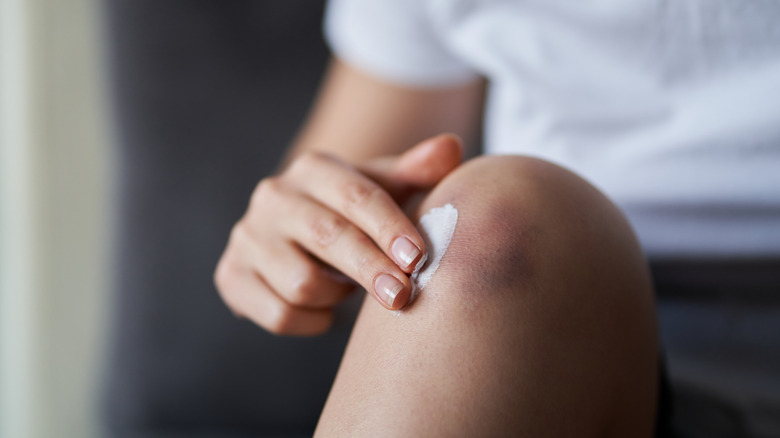Here's Why Your Knee Is Itching
Out of all the places where you can experience an itch, the knee is probably one of the more weird ones. But as the largest joint in the body (via OrthoInfo), the skin on your knee is constantly stretching and moving. Add to the fact that it's often covered with different pieces of clothing –- and therefore fabrics and materials –- there are a lot of opportunities for your knee to become an itching hotspot.
From the outset, an itchy knee is often the result of skin conditions, like contact dermatitis, which can be the result of your knee directly touching "an irritating substance," according to Buoy Health, like soap, bleach, chemicals, and water. Allergic contact dermatitis is also a thing, which happens when the skin comes into contact with an allergen like "plants, metals, soap, fragrance, and cosmetics."
Eczema is another common cause of an itchy knee. Eczema is a broad term for conditions "that cause the skin to become itchy, inflamed, or have a rash-like appearance," according to the National Eczema Association. Of the seven types of eczema, atopic dermatitis is the most common (via NHS).
An itchy knee can be due to an overgrowth of skin cells
An itchy knee can also be caused by rarer conditions involving the skin, including dermatofibroma. According to Buoy Health, a dermatofibroma is a common skin growth that usually occur on the lower leg, but can appear anywhere on your body -– including your knee. Often recognized as a skin tag, these growths are a "non-cancerous, overgrowth of skin cells called fibroblasts." While painless, they can be itchy and become irritated.
While it's not clear why these raised masses of skin grow, it can appear as a result of skin trauma like an insect bite or cut. Dermatofibromas don't magically disappear over time, so if it's constantly itching or inflamed you can talk to your doctor about having it removed.
Whatever the cause may be, if the itching lasts for more than two weeks even with home treatments, according to WebMD, you should seek medical attention. In the case of a rash, this is especially pertinent if it starts to spread and affect other areas of your body.

